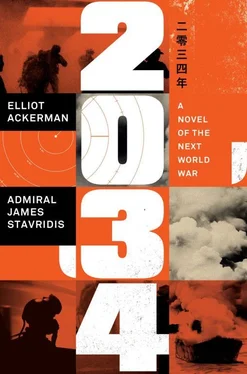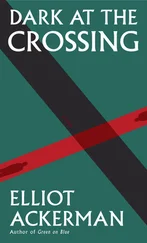Chowdhury lunged upward for the doorknob, as though it were the rung of a ladder placed just out of reach.
Wisecarver swatted his arm down.
The commotion didn’t last long. Three Secret Service agents charged toward them, pulling both Chowdhury and Wisecarver to their feet. Wisecarver was left by the door. Chowdhury was escorted to the other side of the corridor.
“Get him out of here!” shouted Wisecarver.
Before the Secret Service agents could lead anyone away, the door opened.
Chowdhury couldn’t see inside, but he could hear her voice. That persistent and restrained voice of speeches. The voice that had, a long time ago, convinced him that staying in government was a good idea.
It asked, “What the hell is going on out there?”

06:52 July 30, 2034 (GMT+4:30)
Strait of Hormuz
The seconds passed with strange imprecision. Farshad stood steadily among his men, a panicked swarm of conscripts scrambling to their dugouts with boots untied and slung rifles jangling over bare shoulders. Farshad watched the incoming formations of planes, calculating their altitude and distance and factoring for wind. He would pass this along to the antiaircraft gunners who were already cranking at the elevation wheels that raised their barrels skyward, swiveling and locking themselves into position. Farshad then ran to his command post, nothing more than a hole with a radio dug into the rocky sand.
As he crossed the beach, a half dozen impacts struck behind him, blasting up fountains of earth. Then the shock wave. It brought him to his knees. Up again, he continued to run, calculating his steps. Twenty… fifteen… he was almost there. Another group of impacts, this time closer—close enough that the shock wave blew the shirt up his back. Then he toppled over the lip of his command post, landing on his radio operator, who was gathered in a knees-to-chest bundle in the corner of the hole. “Get up,” he growled. The young conscript slowly stood, a pleasing confirmation to Farshad that among his men he remained more frightening than death.
A swift crosswind cleared the smoke from the last barrage. Farshad snatched the radio’s handset. He called out range, altitude, and windage to his gun crews, his ability to triangulate the three being one of those refined soldier skills that proved useless elsewhere in life. All at once, his several antiaircraft batteries began to chug out their fat, egg-shaped explosive rounds. The sky peppered with little detonations. Immediately, Farshad could tell they were off target. He had one battery of directed-energy cannons, but when he looked at them, he could tell their generators weren’t engaged. Another cyberattack? Or shitty maintenance? It didn’t matter.
Another missile barrage fell, this time directly onto his position.
Farshad crumpled forward, hands on his head, eyes shut. He opened his mouth so his eardrums wouldn’t rupture with the overpressure. And he waited, rolling the dice as he’d done so many times before. He could feel the alternating blasts, like a violent wind juking between two opposing directions. The back of his neck was covered in dirt. Then stillness. He lifted his head.
Range… altitude… windage…. Those were his first thoughts. He made his estimations and then gave another order to fire, noticing a slight tinge of desperation in his voice, which he swallowed away. This would be their last chance. The landing paratroopers would overwhelm the garrison if Farshad didn’t take out at least a portion of their transport planes.
Out chugged the egg-shaped explosive rounds.
Again, the sky peppered with little detonations.
Off target—all of them.
Then Farshad realized what he’d done—the fatal mistake he’d made. He’d calculated for wind, but not for wind at altitude. The erratic weather had caused wild atmospheric fluctuations. The crosswind he was experiencing at sea level must not be blowing at several hundred feet—or it was at least blowing differently. Even though he now noticed the inconsistency, it was too late. Standing in his command post, Farshad could do nothing but look above as in quick succession thousands of parachutes blossomed open into tidy skyborne rows.
The antiaircraft guns continued to fire, though they proved ineffective against the dispersed paratroopers. Farshad placed his rifle on the lip of his trench. He glanced from position to position, to the upturned faces of his men. A few took potshots at the descending paratroopers, but most didn’t, perhaps for fear of retribution. The seconds passed, as they had all morning, with strange imprecision.
Time bent.
A life’s worth of consequences existed in the moments it took for a plane to pass overhead. Or for a gust of wind to blow over a dusty fighting hole. Or for a parachute to descend to earth, coming down at… six hundred feet … Farshad watched… five hundred feet … he fingered his trigger… four hundred feet … the radio clutched in his hand… three hundred feet … the crosswind on his face.
The swift crosswind.
Farshad couldn’t believe it at first. Wouldn’t allow himself to believe it.
The crosswind he’d felt all morning caught the first stick of paratroopers as they descended below two hundred feet. Their parachutes, snatched by this slipstream, now raced dramatically across the frontage of the island, yanked out to sea as if by invisible tethers.
They splashed into the water.
Within minutes, thousands of others fell on top of them, all into the water. Although a few paratroopers touched down on the beach, or near enough to swim in, Farshad’s conscripts quickly rounded them up. Soon Farshad was out of his hole, standing on its lip, observing the miraculous expanse of parachutes dispersed across the open water like so many lily pads coating a pond.
Well into that afternoon survivors crawled onto the beach, many retching seawater. The garrison rounded them up one at a time, trotting them off at rifle point with a jaunty confidence that Farshad’s conscripts had hardly earned. Although this battle had cost the Russians an entire Spetsnaz division, Farshad didn’t feel he could count the victory as his own. He and his opposing commander had, after all, made an identical mistake, albeit with different consequences: both of them had incorrectly calculated the wind.
There was an unfairness to it, thought Farshad. But also, an irony. A miscalculation in one circumstance could win a battle, and in another lose it.
By the time the last of the paratroopers splashed into the water, the Russian missiles had stopped falling. Reports from Iranian reconnaissance aircraft scrambled from Bandar Abbas were that the Russian fleet, which was moving from the northern Indian Ocean to reinforce the islands after the paratroopers seized them, had retreated north, back toward the Red Sea and the Syrian port of Tartus.
The Russian prisoners mixed calmly among their Iranian captors, the two sides swapping cigarettes, speaking each other’s languages in broken phrases. Because neither nation existed in a formal state of war with the other, it allowed each side to assume a posture of mea culpa: the Russian paratroopers for their misbegotten and opportunistic invasion, and the Iranian conscripts for inflicting on them the inconvenience of captivity.
Farshad’s state of mind was neither apologetic nor hostile—he was numb. A bone-deep exhaustion had set in. After a battle—particularly a battle won—he had usually felt elation, a nearly uncontainable exuberance as he passed among his men, readying them for a counterattack and radioing his situation report to a congratulatory high command. Not this time. Farshad didn’t have the energy to prepare his men for an unlikely counterattack. As for the high command, when General Bagheri’s helicopter arrived from Bandar Abbas right after nightfall, Farshad could barely muster the effort to receive it.
Читать дальше













